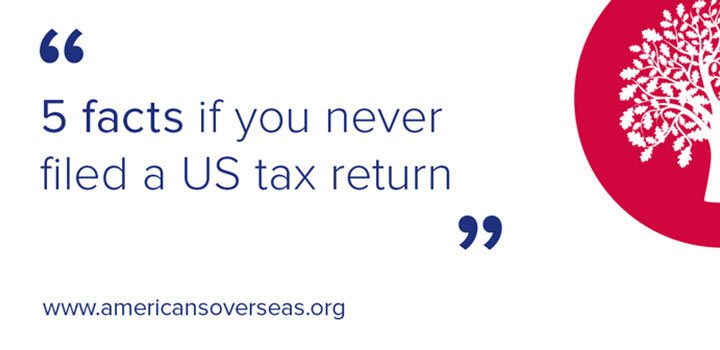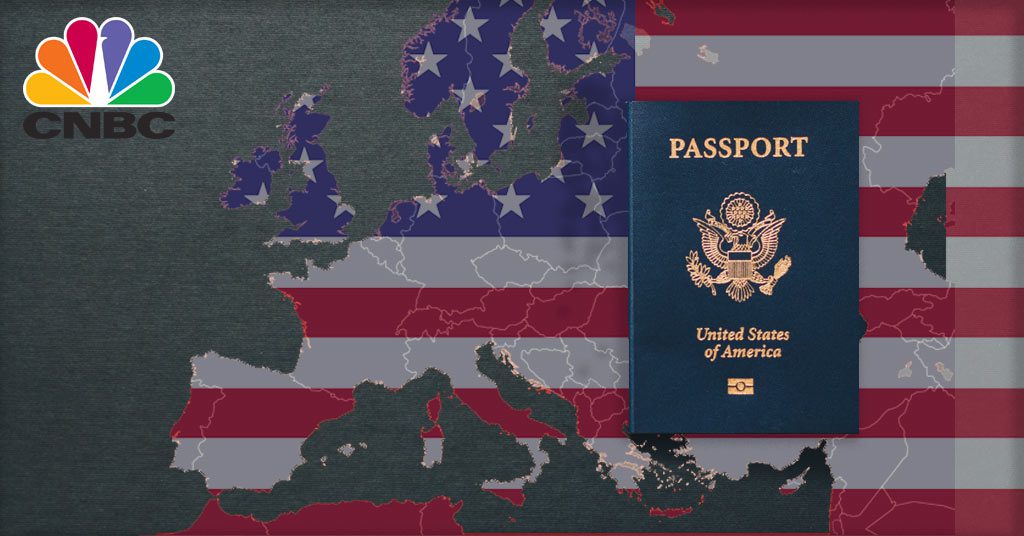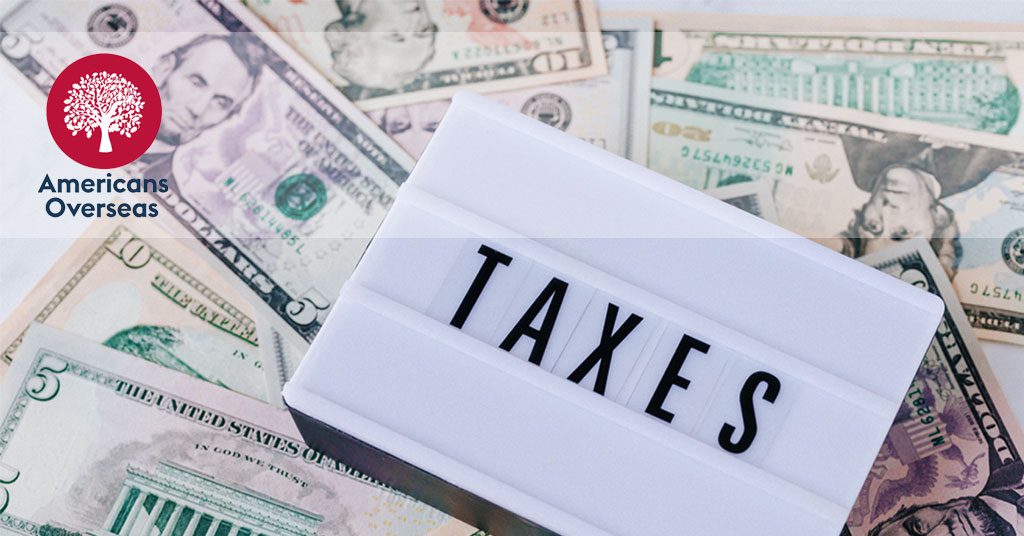
CNBC: Accidental American uphill tax battle with IRS

Are you an accidental American? Are you among the individuals who are considered a U.S. citizen – because you were born there or because you had at least one parent who is a U.S. citizen – but are unaware of this status? Then you must file income, estate, and gift tax returns with the IRS according to CNBC.
Accidental American: Accidentally born in the U.S.
Earl of Manchester, England, may not feel like he is an American. The IRS would say otherwise. He is a so-called ‘Accidental American’.
The 54-year-old was born in Tennessee, to British parents. He stayed in the U.S. for about a year before moving to the United Kingdom, where he has lived ever since.
“I have an American birth certificate and a document that’s a registry of live birth from the British consulate,” Earl said. “I’ve always considered myself a British citizen.”
This wasn’t a problem until Earl opened a bank account in England and put down “Nashville” as his place of birth on the application.
His answer kicked off another request from the bank: “We need your Social Security number (SSN).”
Accidental American living in Europe
Earl is among thousands of “accidental Americans” residing in Europe who are finding out that they are subject to tax reporting requirements from the IRS, as well as foreign account filings with the Treasury Department.
About 9 million Americans reside abroad, according to the U.S. Department of State. They are considered U.S. citizens but are unaware of their status. They may have been born in the U.S. but resided here briefly, or they have at least one parent who is a U.S. citizen.
The U.S. taxes individuals globally based on their citizenship, meaning they must file income, estate, and gift tax returns with the IRS. They must also tell federal authorities about their foreign accounts.
Accidental American compliance
Compliance can be complicated. Accidental Americans must obtain a Social Security number or an Individual Taxpayer Identification Number to report to the IRS and begin filing their taxes.
Further, foreign banks are required to share information with the IRS on their American account holders, so the institutions are now asking these customers for their Social Security number or ITIN.
If you’re someone who happens to be born in the U.S. to French or German parents and you leave at an early age, you don’t associate with being a U.S. person. One day, you get a letter from your bank saying you’re an American and that they need your Social Security number. Your first response is ‘I’m not American’. In that case, you’re an accidental American.
But if you do not provide your bank with an SSN or ITIN, there is a chance your bank account will be blocked.
FATCA
At the heart of the matter is the Foreign Account Tax Compliance Act, or FATCA — the law that requires Americans to tell federal authorities about their foreign accounts.
Accidental Americans are required to file FBAR (Foreign Bank and Financial Accounts)
These Americans must file a report of Foreign Bank and Financial Accounts, or FBAR, with the Treasury Department’s Financial Crimes Enforcement Network.
You’re required to file an FBAR if you had an interest in or signatory authority over at least one account outside the U.S., and the aggregate value of all the foreign accounts exceeded $10,000 at any time in the year.
Failure to submit an FBAR comes with hefty fines.There’s a $12,921 penalty for non-willful violations, while individuals who flout the law could face fines of up to $129,210 or 50% of the account.
Accidental American and Form 8938
Separately, citizens who file an FBAR may also need to submit Form 8938 to the IRS. This is known as a statement of specified foreign assets. Whether you’re required to submit this form depends on where you reside and whether your foreign asset holdings meet a set threshold.
The IRS has sought to simplify FATCA compliance for Americans abroad through streamlined compliance procedures and additional amnesty (Relief Procedures for Certain Former Citizens) for those who have given up their citizenship.
In both cases, these people must file back taxes. The complexity of tax compliance has led some Americans overseas to renounce their citizenship. More than 600 people took this step in the second quarter.
Accidental Americans must provide SSNs to Foreign financial institutions
Foreign financial institutions have compliance requirements with FATCA — they must share with the IRS information on American account holders.The IRS gave these banks until the end of 2019 to obtain an ITIN or Social Security number for these clients or else face penalties.
Foreign financial institutions have to comply with FATCA, but the truth is that many U.S. citizens don’t have a Social Security number, and to get one is a pretty trying process.
Accidental Americans must go to the U.S. embassy for documents
These individuals must go to the U.S. embassy in their country of residence, apply for a Social Security number, and provide an official birth certificate and additional documents to prove they’ve been living abroad all this time.
For instance, Xavier, 68, originally born in Washington, D.C., has had to travel more than 300 miles to the Federal Benefits Unit at the U.S. embassy in Paris to apply for a Social Security number.
The authorities asked for an official birth certificate, which Xavier couldn’t obtain because he didn’t have sufficient documentation and proof of identity. He’s now working on getting an ITIN instead, which warrants another trip to the embassy.
“I can cope with this well: I speak English and I have time because I’m retired,” Xavier said. “Other people can’t do this so easily, and I maintain that some will never be able to follow this procedure.”
More information for the Accidental American | American Overseas
We, the founders of Americans Overseas, were born in the Netherlands and obtained our American nationality through our (American) mother.
When we heard about the US tax system for the first time around 2013, we were in total disbelief (it can’t be true!), anger (how can they do this?), fear (am I going to get fined or pick up other problems?), and panic (what should I do?). It is (unfortunately) true that there is an additional American tax levy. But there’s no information from the local government, and when approached, the consulate referred us to the IRS, and the IRS was impenetrable.
That’s why we started this initiative to help people from all over the world by providing proper information about the US tax system to avoid unnecessary panic and offering help free of obligation and free of charge. If needed, we have a network of affordable professionals (accountants) who can help you with your tax obligations.
If you have more questions about the new relief program you can contact us at Americans Overseas.
Contact us for more information
Source: CNBC
Frequently asked questions
Understanding the US tax system, the obligations, and all the additional terms can be difficult. Especially if one lives outside of America. Is your question not answered? Contact us.
-
Who is required to file taxes in the US?
U.S. citizens and resident aliens who live abroad are generally required to file a federal income tax return and pay taxes on their worldwide income.
Read more... about Who is required to file taxes in the US? -
Do US citizens living abroad still have to file taxes in the US?
Yes, US citizens are required to file taxes on their worldwide income, regardless of where they are living.
Read more... about Do US citizens living abroad still have to file taxes in the US? -
How can I cash my US check?
Received an American check? You can cash your check in the following ways: cash the check at your own bank, transfer to another person (endorsement), cash checks using an online service or cash the check by another bank.
Read more... about How can I cash my US check? -
Are there any special tax forms required for US citizens living abroad?
US citizens living abroad may be required to file Form 2555 and/or Form 1116 to claim the foreign-earned income exclusion.
Read more... about Are there any special tax forms required for US citizens living abroad? -
What is FBAR filing?
FBAR (Foreign Bank Account Report) filing is the requirement for certain U.S. individuals and entities to report their foreign financial accounts to the Financial Crimes Enforcement Network (FinCEN) of the U.S. Department of Treasury. The FBAR filing requirement applies to U.S. persons who have a financial interest in, or signature authority over, one or more foreign financial accounts if the aggregate value of those accounts exceeds $10,000 at any time during the calendar year.
Read more... about What is FBAR filing?





